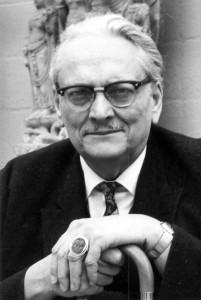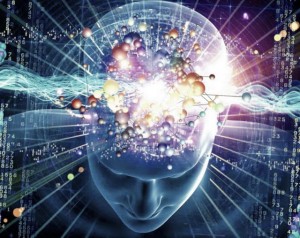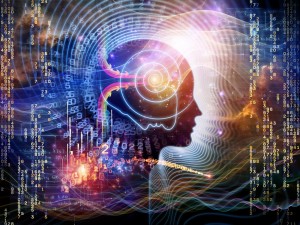
Manly P. Hall (1901-1990) a fost un mare scriitor și mistic canadian. Încă de la vârsta de 18 ani a fost atras de ezoterism și misticism, iar la 19 ani a ținut primul său discurs, despre reîncarnare. La 25 ani a scris tratatul celebru “The Secret Teachings of All Ages” (tradus în limba română cu titlul Învățăturile magice secrete ale tuturor timpurilor), un compendiu despre filosofia anticilor, hermetism, gnosticism, rosicrucianism, care l-a inspirat printre alții și pe scriitorul Dan Brown în elaborarea cărții sale Simbolul secret.
Pe lângă cărțile și eseurile publicate (peste 150), în care dezvăluie în lucrările sale multe din misterele ale lumii și explică pe înțelesul tuturor multe elemente de simbolistică, Manly P. Hall a ținut foarte multe conferințe (peste 8.000), o serie din ele fiind disponibile pe Youtube. Conferințele sunt foarte instructive și educative și ne ajută să înțelegem mai bine gândirea acestuia și perspectiva sa.
În conferința “Unveiling the hidden mysteries of human mind”, Hall vorbește despre mintea umană și rolul ei în sistemul complex care este omul, funcțiile pe care le are, rapoartele cu trupul și cu emoțiile, modul în care emoțiile afectează trupul și ce putem face pentru a avea o gândire corectă și un organism armonios.
Mintea este prezentată ca supremul conducator, care reglementează imperiul în miniatură constituit de ființa umană. Trupul uman nu poate decât să accepte sclavia emoțiilor și a minții și nu are la cine să recurgă, ci se poate manifesta doar intrând în grevă. Mintea ar trebui să respecte trupul, să știe că emoțiile, de exemplu, afectează puternic structura și funcțiile trupului, contribuie la uzura sa, și îl secătuiesc de energii.
The individual is governed by its own mental equipment, which he very seldom questions, for the simple reason he has nothing to question the mind with, except the mind. He has to analyze the thinking equipment, and of course, for some unknown reason, the mind nearly always wins the argument. It does what it wants to do.
The mind, as general commander in chief of the body, is controlling a complete miniature empire which we call the human being. This empire includes every type of life that is found in the larger theater of the world around us. This empire within us has its continents, its races, it has its arts and sciences, it has its transportation and its own educational theories. It is a complete world, living and existing on three distinct levels: these levels are for the most part obvious, recognized, and in one way or another, misused.
The physical body is the final basis of the human personal integration. It is here to work, it is here to do what the mind and emotions want it to do. And the fact the mind and emotions may not be very good about their own desires – this the body has to stand. The body has to accept the domination of superior instruments which are often dishonorable. So the body has to do what we want it to do. If we want it to be on his feet, it stays there until it falls of fatigue. The body has no recourse to anything below itself. It has to accept the final slavery imposed upon it by the mind and emotions.
The body has not any rights, but the body has one power that cannot be denied: it has the right to strike. When it has enough of something, it simply announces displeasure. This announcement is accompanied by discomfort. If the situation is too serious, the body may be subject to fatal consequences.
The superior part of man should respect the body, should realize that this structure is a common wealth, it has its obligations, duties and at the same time confers definite benefits on the personality, which is motivating.
Emotions like hate are exactly as bad on the body as poisoned gas. All the things that we do emotionally, that are destructive, injure the body. The idea that we can have a strong body and perverted emotions is simply unrealistic. But then, most of our attitudes are unrealistic, because we base them upon what we want to do, rather than what we should do. The emotional pressures against the physical body can result in a variety of ailments which are now generally recognized and are being studied.
The emotions are also depleting and debilitating the physical body, they are adding to its wear and tear, they are struggling to preserve their own purposes.
What the emotions want, – desire being one of the most prominent of emotional functions – they demand, and there is no consideration for consequences (eg. alcoholism).
Din abordările istorice ale medicilor, Hall dă ca exemplu medicii chinezi, care erau plătiți atâta timp cât pacienții lor erau sănătoși. Astfel medicii erau stimulați să facă tot posibilul pentru a-i menține pe pacienți sănătoși, și astfel era nevoie să-i învețe să respecte legile vieții, să devină responsabili pentru bunăstarea ființei lor, să facă ceea ce trebuie.
The individual who wants to stay well must become aware of the responsibilities of the superior person. The only way to stay well is to keep right. The superior person is the only individual who has the right to be healthy.
An individual who doesn’t keep the rules of life doesn’t have any right to have a healthy body. It doesn’t have any right to have a happy and comfortable relationship with its own physical structure. The moment he breaks the rules physically – which he does, because of mental and emotional pressure – the body suffers.
And if this goes on long enough, the Chinese physician must point out that the individual trying to do what he pleases rather than what he should is shortening his life and depressing its own actions and cultures.
Dar cum știm să facem ceea ce trebuie? Manly P. Hall precizează că abia aici avem de-a face cu o primă utilizare pozitivă a minții. Mintea are dreptul să fie auzită și noi suntem obligați să o instruim să fie ascultată și să guverneze corect. Mintea este un instrument misterios, care ar trebui să lucreze în armonie cu emoțiile și să protejeze interesele corpului.
If the mind is right, the body will be reasonably well, and the emotions will be stable. If the mind loses its own integration, or fails to maintain its proper relation with life, then the other two factors will immediately sicken.
Mai departe, Hall vorbește despre rolul educației omului în devenirea societății din perspectiva confucianistă, în sensul de a-l face pe acesta să înțeleagă scopul minții, al gândirii, precum și despre caracteristicile ființei superioare:
The mind should be taught that the most important thing is that it should be a benevolent organizer and a benevolent executive. It is like a country: if the country has a good ruler, the people flourish; if it has a bad ruler, they suffer. If the ruler is ambitious, runs them into wars, death and revolution, the same things happen in the human body: the sickness sets in and there is no immediate solution.
What is a superior person? A superior person is one that is above committing inferior deeds. Anything that is destructive, selfish, that damages the public good or the private good must be considered as against the production of a superior person. The superior person must be a builder, not a wrecker. The superior person must put others before himself, he must recognize genius where it exists, he must serve integrity where he finds it, and in its personal life he must keep the rules of the Confucian code – one of the earliest code to include the statement: We should do unto others as we would wish that they would do unto us.
Prin urmare, primul pas în educația omului ar trebui să fie învățarea conceptului de integritate/onestitate, de ce trebuie fiecare să își însușească acest concept dacă vrea să fie fericit.
În restul conferinței, Manly P. Hall încearcă să explice cum a ajuns societatea în starea actuală, de ce lucrurile de mai sus nu sunt incluse în educația oamenilor, și ce soluții se pot găsi pentru a rezolva situația, pentru a reprograma gândirea.
Every problem we have is from the mind. And every cure we’ve ever tried to make was also from the mind.
The great problem is how to use the mind.
The mind is part of the compound of created things, and this compound is bestowed by a wisdom far grater than our own. It comes from a source of life which has decided that to think is one of the important processes of growth.
We can begin to use the mind to solve its own mistakes.
If we feed the mind with junk, we will have junky decisions. There are penalties or prizes upon everything in nature. The penalty for a misdeed is misery. The prize of a good deed is intelligence. The individual must use the faculties that he has the way they were intended to be use if he expects to benefit from them.
We must begin to train the mind to think, and not to inherit the notions of other people. We have to train the mind to contribute to the future rather than build all of its wealth and strength from the past. The past is important, but only to the degree it gives us true insights into the repetition of ancient fallacies.
The mind must come to the realization that it exists to learn what is right and do it.
It is impossible to break the rules of life and be happy.
Este interesant că Manly P. Hall vorbește despre legăturile între gândirea deficientă și durerile de cap, sau între gelozie și ulcere, și afirmă că în general orice nu facem corect și conform cu legile vieții se va somatiza cumva în corp într-o durere sau într-o suferință.
In our own little ways, we have headaches, dyspepsia, indigestion. Headaches are sometimes legitimate, but more often misconduct is the basis of headaches. The individual with a headache is the one who is worried when he should have thought; an individual who ate when he should not have eaten; an individual who got into an argument that he should not have gotten into. All kinds of negative, destructive fears, anxieties, worries and antagonisms, until he gets so miserable that he takes more aspirin. Now, aspirin is not a cure for anything; it reduces symptoms for a little bit. But the only cure for the difficulties that aspirin is taken for is clear thinking. An individual, by thinking himself through, dismays of his misconduct and finds a way to remove all his headaches. Those that remain may represent a need for a medical or psychological attention. An individual may need to go as far as his diet to find the roots of some of his headaches, but most of the headaches come from above, in the head. And it is in the head where the headache arises, in the mind.
If you are jealous long enough, the reward is likely to be ulcers. The hard words you use continue in you and they become a gastrointestinal difficulty. The final, immediate payment is not karma in a future life, but misery here and now.
No matter what we do that is wrong, something is going to hurt or itch somewhere. And this itch is in itself a valid statement of facts. Where the individual has a wrong attitude, he is going to pay for it.
O altă idee interesantă a lui Hall este să analizăm sentimentele/emoțiile negative pe care le-am avut de-a lungul timpului și să vedem dacă ne-au adus vreun folos:
If we start analyzing these things and breaking them down, we gradually come to realize that all of the negative, unhealthy attitudes that we have are bad bargains. So we did not talk to our aunt for 25 years, in our heart it was a wrangle, there was a hatred, a disturbance, and in the body that means there is an acidosis. You cannot hate somebody without the body suffering. You cannot ignore a virtue without giving grounds to a vice. But most of all, you cannot continue to build a temperament around mistaken attitudes without ultimately shortening your life, increasing sickness and alienating yourself from the things that made life valuable.
Concluzii:
The mistakes that we made through ignorance, we must correct through intelligence. The mind at the very beginning became more and more immersed in such problems of survival, it tried to build a philosophy around the small things of life, but little by little it created a civilization, which is a compound of uncivilized people. It is not something that we can be proud of. And it will never get better unless we do something about it.
To make a major change for the average individual means to simply change his attitude towards life. If he gets a straight view of life, he is becoming a free citizen of the Universe. And a parent who cannot change the political system can at the same time communicate to children the real facts of how to survive, even in a catastrophy.
What is wanted more than anything else is the human being who is able to become a permanent factor for good in the evolution of humanity. The development of humanity is a project carried on by powers greater than ourselves. A great wave of life is moving though space and we are part of it.
In addition to these various laws, what is it that can we do to outwit the mind? That is the emotions: the emotions are far older than the mind, but they are a different type of thing. If emotions are hate, they will enlist the aid of the mind to make the hate the most important thing in the world. This is what happens with wars: wars are emotions stirred up to become mental hatreds. If however, on another angle of the matter, the heart and the emotions are in someway enriched, ennobled and made more significant to us, the results are a great deal of more peace and charity and insight. So we can say above selfishness it can occasionally arise a great heroism. And a great heroism is an individual rising above its own security to protect something greater than himself. And this is in almost every case love and compassion. The individual who is able to strengthen its emotional realizations of life, who is able to love honestly, is in a position to gain many benefits, almost immediately.
The more peaceful we become, the more gentle we are, the more we love those who are close to us, and in a large way those who need it everywhere in the world, the more we get over the advantages to self and realize that we live in a world that must live and die together, if we must realize in the end that there can be no final good for us as persons unless we have helped to build a common good among all persons.
Surse foto: Google, Journalpsyche.org, thenegativepsychologist.com

